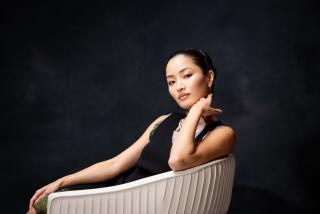She Beat Long Odds of Spina Bifida
- Share via
She came into the world with a mass of nerve tissue the size of a cantaloupe protruding from the base of her spine. Doctors told her parents that they would be better off leaving her behind in the hospital and letting nature take its course.
Afflicted with a crippling spinal disease, their third child would not live much longer, doctors predicted, and if she did survive, she would be severely retarded and paralyzed.
Her father agreed. But Sharon Kawai’s mother insisted on bringing the sickly infant home.
Forty-two years and 50 operations later, Kawai is a doctor, mother of three and tireless advocate for the disabled. One of the first adult survivors of spina bifida, she has beaten overwhelming odds, and, by her courageous example, is helping others with physical disabilities to lead independent, productive lives.
“My life back then certainly didn’t look like much. It was pretty pathetic, really,” the Fullerton resident said. “Not even my mother could have foreseen what has been possible in my life. That’s what I want to tell people. Look at the odds that have been against me from Day One and look what you can accomplish.”
From her wheelchair, which she uses for efficiency’s sake, Kawai oversees rehabilitative programs at St. Jude Hospital & Rehabilitation Center in Fullerton, working with patients who have become physically disabled after a stroke or brain injury.
“Sharon is not intimidating to the patients because she comes across as someone they can relate to,” said Barry Ross, vice president of rehabilitative services at St. Jude. “They look at her and they know she’s been through it herself. She shows that a disability doesn’t have to be a disability.”
Despite grueling 12-hour workdays, Kawai finds time to serve on the board of Goodwill Industries of Orange County and is actively involved with the Special Olympics. She was recently inducted into the Governor’s Hall of Fame for People With Disabilities.
“She is a charming person who has a unique ability to view a specific need and translate that into a policy for the board,” said George Kessinger, president of Goodwill Industries, an organization that provides vocational training for disabled persons.
Friends and colleagues describe Kawai as a dynamo who sets personal goals and defies anyone to stand in her way.
On a recent afternoon, she was relaxing in her office at St. Jude, chatting excitedly about the previous weekend when she pushed her wheelchair 26 miles alongside “able-bodied” runners in the Long Beach Marathon to raise money for charity.
“The spectators were wonderful,” she said. “My number was 4247 and they kept calling out, ‘Come on 4247, you can do it!’ ”
She views the event held last month as a turning point in her life, the first time in 42 years that she felt like “one of the other kids on the block.”
“When I was growing up, people would always say, ‘You’re crippled, you can’t do that,’ ” Kawai said. “This was the only sport that I’d ever been allowed to participate in and it’s helped me to have some confidence and self-esteem that I’ve lacked for many years.”
It is difficult to imagine Kawai as a painfully shy child who would quickly push her wheelchair to the back yard when she heard a car approaching her home in Columbus, Ohio, so that strangers would not be made uncomfortable by the sight of her disability. Today, Dr. Kawai exudes confidence, peppering her conversation with jokes about some of her most painful struggles.
“When I was born, most of the babies with spina bifida were not surviving. I’ve kind of outlived their predictions,” she said, her 4-foot, 10-inch frame rocking with laughter.
Kawai, who was born with the most severe form of spina bifida, was never expected to make it to adulthood. She was 2 years old when she had her first operation. Doctors implanted a shunt in her brain to prevent spinal fluid from accumulating there and rendering her severely retarded. By the time she was 16, she had already undergone 30 major operations.
“When I was 4 years old, I was aware that the odds of my surviving to my fifth birthday were not good,” Kawai said. “So I made the decision that if I was going to survive, I was going to have goals just like everyone else.”
During one hospital stay, she met Nancy, a little girl her own age who was dying of leukemia. That encounter inspired her to become a doctor. “I had to bend over to read her lips to hear my name, but even though she was too weak to even shake my hand, she had a twinkle in her eye and she was living life to the fullest,” Kawai said. “It clicked in my mind that being a physician was something worthwhile that I could do to help people like Nancy.”
But first, she had to help herself.
While other children idled away the summer, Kawai spent her vacation recovering from surgery. She didn’t want to miss school, because she had fought too hard to gain entry. Columbus officials didn’t want her to attend public schools because of her disability.
“Well, of course, when they told me I couldn’t go to school, it made school seem like this giant, mint, chocolate-chip ice cream cone in the sky that they were trying to deprive me of,” Kawai said. “So that just made me want it more.”
An older sister persuaded a teacher to tutor Kawai at home. At the time, Kawai was confined to a full body brace and could assume only two positions--standing up or lying down. When the year was over, she applied to her neighborhood elementary school and was turned down again.
Undaunted, Kawai gained admittance to a private school originally founded for children recovering from tuberculosis. She remained there through sixth grade, then she applied to her local junior high school. She was rejected again.
“They said, ‘If you get knocked down, you might try to sue us,’ ” Kawai remembered. “And they said, ‘She’s probably not bright enough to make it with our kids.’ ”
Kawai’s parents looked outside their upper-middle-class neighborhood to an inner-city school that agreed to admit Kawai as its first disabled student. The children made fun of her orthopedic shoes and leg braces.
“They used to say, ‘Look at the freak in the baby shoes.’ I’d come home and cry and say, ‘They are right; I am weird,’ ” Kawai recounted. “I was a spindly, skinny little runt and at that time, skinny wasn’t in.”
Ever supportive, her mother dried her tears and advised her to seek friends who would look beyond her physical disability. She took up violin and joined the orchestra. She signed up for the Latin club and played piano for the choir, all the while bringing home straight-A report cards.
Still, the high marks were apparently not enough to win over public school officials in her neighborhood, who grudgingly admitted her to the local high school under a two-week probation period. “It was a very rough time for me as a teen-ager and, for a while, death seemed like a better option,” Kawai said. “I think the only thing that kept me going then was the fact that my mom had gone through so much with me and every time I’d wake up from the surgery, I’d see her smiling, with tears in her eyes, relieved that her little girl had made it through another surgery.”
Kawai is still healing from the wounds of a tortured childhood.
The road to recovery began 20 years ago when she met her husband-to-be, a shy, Japanese business student, at a church social. Tom Kawai had come to the United States to study business at the University of Pennsylvania Wharton School. She was doing her graduate work at the Medical College of Pennsylvania. They married two years later.
“Sharon touches the heart of everyone who meets her,” Tom said. “I was not concerned about the physical. I was taken with her genuine appreciation of people and her unique values and vision.”
The Kawais have three children, John, 12, Trisha, 10, and David, 4. “They are the gems of my life,” Kawai said. “Those children are my jewels because they are something I thought I’d never have.”
More to Read
Sign up for Essential California
The most important California stories and recommendations in your inbox every morning.
You may occasionally receive promotional content from the Los Angeles Times.













